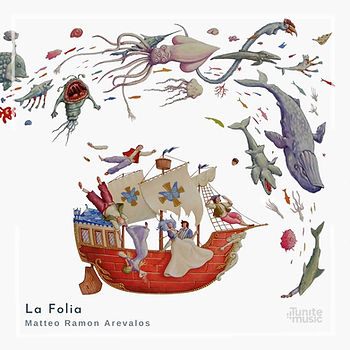
“SCAVENGER” by Richard X Bennett is a deeply personal exploration of life, art, and survival, translated into thirteen tracks that fuse genres, styles, and emotions. On the surface, the album may seem like a jazz-influenced work, but a closer listen reveals a much broader range of influences, from experimental music and contemporary classical elements to electronic and late Romantic piano solos. This fusion creates a sound that is uniquely Bennett’s, a sonic story reflecting both his life and his battle with illness.
The album was originally conceived as a project where discarded sound files would form the foundation of the music, echoing the theme of scavenging. However, in November 2023, Bennett was diagnosed with pancreatic cancer, which transformed “SCAVENGER” into something much more profound. It became a multi-media project that delves into pain, chemotherapy, and the artist’s personal journey through illness. As Bennett himself put it,
“I didn’t stop being funky just because I was sick.”
The result is a powerful blend of music that is both emotionally raw and sonically grooving.
One of the most striking features of the album is its treatment of vocals and instruments. While most of the instruments retain their natural, acoustic sound—enhanced only slightly with effects like reverb or compression to clarify their tone—the vocals take a completely different approach. Many of the vocal tracks are heavily affected, sometimes even blending into the instrumental layers. This contrast between the organic and the manipulated gives the album an intriguing texture, where the lines between human and machine, organic and artificial, begin to blur.
Also on a personal note, this treatment of the vocals made the album sound like a fully instrumental musical work for me. The vocals are part of the instruments with a stronger communication power and are not in any sense taking the center stage.
A standout track is “Raga Puriya Dhanashree Alap,” an 18-minute live performance recorded at Columbia University. This piece draws on Indian and Middle Eastern musical traditions, using complex rhythmic patterns and harmonic structures to create an exotic, ever-evolving soundscape. The music, through-composed, builds continuously, with the melody expanding as the piece progresses, generating a sense of perpetual growth. While it may challenge listeners who are unfamiliar with these musical forms, its beauty lies in its depth and complexity. If you focus on the melodic and harmonic evolution, the piece becomes a deeply satisfying listening experience.
The thematic scope of “SCAVENGER” extends beyond music. The project is also a visual and narrative exploration of illness, with Bennett weaving in his life experiences as a backgammon gambler and a trash collector. The accompanying film, “SCAVENGER in Six Parts”, features lo-fi visuals of trash, botany, mutating cells, and Bennett’s own quirky dancing. As Bennett describes,
“It’s like stained glass windows in motion, to be seen running in a loop on walls, floors, or roofs.”
Each of the six sections—such as “Twelve Days of Chemo,” “All I Have Left is My Words,” and “How to Kill a Plant”—explores different aspects of memory, fight, and survival.
Bennett’s commitment to creating art in the face of adversity shines through every note and frame of this project. As he reflects on the experience,
“Making art during this time was cathartic. Hopefully, these pieces will impact and help others as well. I’d be delighted if it gave people some deep pleasure.”
The album also features collaborations with other artists, including an imaginative reimagining/remix album titled “Love and Forgetting”, created with British electronic musician Aaron Dolton (aka HUW), which draws on the themes of illness and metaphysics.
Ultimately, “SCAVENGER” is a testament to the power of art to transform pain into something beautiful. Whether you’re drawn to its eclectic musical style, its experimental visual components, or its deeply personal narrative, the project offers something unique and compelling for listeners and viewers alike. Bennett’s ability to merge the emotional and the intellectual, the funky and the raw, makes “SCAVENGER” a standout work that defies easy categorization, but demands thoughtful engagement.
Credits:
Richard X Bennett – songs, piano, vibes, harmonica, melodica
with:
Johanna Burnheart – violin (#2)
Teagan Faran – viola & violin (#4, 11)
Michael Blake – saxophone (#1, 4, 7)
Matt Parker – saxophone & flute (#1, 4)
Paula Jeanine Bennett – conga, djembe, shaker, voice (#1, 4, 5, 6, 8)
Michael Wimberly – djembe & bell (#1, 2, 4, 7)
Gaku Takanashi – bass (#6)
Adam Armstrong – bass (#7, 8, 9)
Julian Edmond – drums (#1)
Tony Lewis – drums (#4, 6)
Eric Halvorson – drums (#5)
Alex Wyatt – drums (#7, 9)
and:
Sadie Dawkins Rosales – voice (#10)
Zachary Hann – clarinet (#10)
Rebecca Moranis – flute (#10)
Julian Bennett Holmes – harpsichord & vibes (#10, 11)
Leo Sussman – flute (#11)
Mastered by Aaron Dolton
“Love and Forgetting” lyrics by Paula Jeanine Bennett
———————
Love and Forgetting – (tracks 12 and 13)
Produced by HUW
rXb – piano, vibes, voice, lyrics (#12)
Paula Jeanine Bennett – poetry and voice (#13)
#RichardXBennett #SCAVENGERAlbum #JazzFusion #ExperimentalMusic #ContemporaryClassical #RagaMusic #MultiMediaArt #MusicReview #CancerArt #PancreaticCancer #AmbientMusic #IndianClassicalMusic #MusicAndHealing #ExperimentalJazz #ElectronicMusic #LivePerformance #CrossCulturalMusic #InnovativeArt #MusicInspiration #AlbumReview #MusicalJourney







